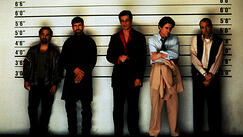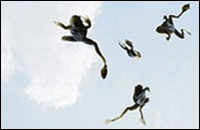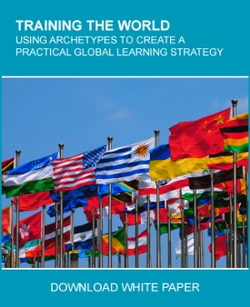by Rich Mesch
Stories are compelling when you think you know what’s going to happen next, and then the story throws in a twist. You can do the same thing in your learning stories; the only issue is that you need some grounding in reality.
Movies fre quently build interest by inserting compelling story twists. I won’t include any spoilers, but most people will admit to being thrown for a loop when they learned the truth about Bruce Willis’ character in The Sixth Sense or who Keyser Soze really was in The Usual Suspects. But the technique is nothing new; Alfred Hitchock shocked the movie-going world in 1960 when he killed off the main character in Psycho ten minutes into the film.
quently build interest by inserting compelling story twists. I won’t include any spoilers, but most people will admit to being thrown for a loop when they learned the truth about Bruce Willis’ character in The Sixth Sense or who Keyser Soze really was in The Usual Suspects. But the technique is nothing new; Alfred Hitchock shocked the movie-going world in 1960 when he killed off the main character in Psycho ten minutes into the film.
One of the oddest twists is in the film Magnolia; the story takes a twist when it unexpectedly starts raining frogs. And perhaps that’s the key difference between movie storytelling and learning storytelling. If your story completely deviates from reality, you’ll probably lose your audience. So your story probably shouldn’t have any froggy precipitation.
story takes a twist when it unexpectedly starts raining frogs. And perhaps that’s the key difference between movie storytelling and learning storytelling. If your story completely deviates from reality, you’ll probably lose your audience. So your story probably shouldn’t have any froggy precipitation.
For learning stories, I recommend the use of the “Predictable Unexpected.” That means, create events that are unexpected in the context of your story, but typical in the real world. For example, in a sales simulation I designed, you spend a long time building a relationship with a client, in hopes that he will introduce you to an executive. If you successfully build the relationship, the client agrees to invite you to a meeting with the executive. When you try to return his call, you get a message that his phone line has been disconnected. He’s been fired, he’s not going to get you that meeting with the executive, and you have to begin the process over again. The event was unexpected, but completely realistic within the scope of the storyline. And still completely gut-wrenching.
We’ll take this a little further in the next post, where we’ll talk about the role of reality in storytelling. How much reality is too much?
Stories are compelling when you think you know what’s going to happen next, and then the story throws in a twist. You can do the same thing in your learning stories; the only issue is that you need some grounding in reality.
Movies fre
 quently build interest by inserting compelling story twists. I won’t include any spoilers, but most people will admit to being thrown for a loop when they learned the truth about Bruce Willis’ character in The Sixth Sense or who Keyser Soze really was in The Usual Suspects. But the technique is nothing new; Alfred Hitchock shocked the movie-going world in 1960 when he killed off the main character in Psycho ten minutes into the film.
quently build interest by inserting compelling story twists. I won’t include any spoilers, but most people will admit to being thrown for a loop when they learned the truth about Bruce Willis’ character in The Sixth Sense or who Keyser Soze really was in The Usual Suspects. But the technique is nothing new; Alfred Hitchock shocked the movie-going world in 1960 when he killed off the main character in Psycho ten minutes into the film.One of the oddest twists is in the film Magnolia; the
 story takes a twist when it unexpectedly starts raining frogs. And perhaps that’s the key difference between movie storytelling and learning storytelling. If your story completely deviates from reality, you’ll probably lose your audience. So your story probably shouldn’t have any froggy precipitation.
story takes a twist when it unexpectedly starts raining frogs. And perhaps that’s the key difference between movie storytelling and learning storytelling. If your story completely deviates from reality, you’ll probably lose your audience. So your story probably shouldn’t have any froggy precipitation.For learning stories, I recommend the use of the “Predictable Unexpected.” That means, create events that are unexpected in the context of your story, but typical in the real world. For example, in a sales simulation I designed, you spend a long time building a relationship with a client, in hopes that he will introduce you to an executive. If you successfully build the relationship, the client agrees to invite you to a meeting with the executive. When you try to return his call, you get a message that his phone line has been disconnected. He’s been fired, he’s not going to get you that meeting with the executive, and you have to begin the process over again. The event was unexpected, but completely realistic within the scope of the storyline. And still completely gut-wrenching.
We’ll take this a little further in the next post, where we’ll talk about the role of reality in storytelling. How much reality is too much?


